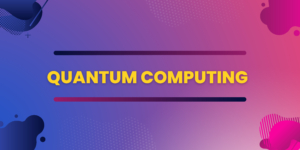the question “Is quantum computing a Turing machine?” opens a door to the fascinating world of quantum mechanics and computation. While quantum computing challenges classical paradigms, it also offers unprecedented possibilities.
Is Quantum Computing a Turing Machine?
Ans– NO, Quantum computing challenges the classical notion of computability. While Turing machines rely on deterministic processes. hence Quantum computing is not the Turing machine.
What is Quantum Technology?
Understanding quantum technology requires a grasp of the fundamental principles of quantum mechanics. It is a rapidly emerging technology that harnesses the laws of quantum mechanics to solve problems too complex for classical computers. It uses quantum bits or qubits, which can exist in multiple states simultaneously, to perform calculations.

Advantages of Quantum Computing
1)Parallel Processing
One of the remarkable advantages of quantum computing is parallel processing. Traditional computers process tasks sequentially, but quantum computers can handle multiple computations simultaneously, leading to unparalleled speed and efficiency.
2) Exponential Speedup
Quantum computers excel at solving complex problems exponentially faster than classical computers. This advantage becomes particularly evident in scenarios involving extensive calculations, like simulations and data analysis.
3) Solving Complex Problems
Quantum computing shows promise in solving problems deemed practically impossible for classical computers. This includes optimization problems, factorization, and complex simulations that could revolutionize various industries.
4) Impact on Cryptography
The advent of quantum computing poses a challenge to classical cryptographic methods. Quantum computers could potentially break widely used encryption algorithms, sparking the need for quantum-resistant cryptographic solutions.

What is Adiabatic Quantum Computing
To understand Adiabatic Quantum computing first we need to understand what is Adiabatic Processes in Quantum Mechanics:
At the core of adiabatic quantum computing is the concept of adiabatic processes in quantum mechanics. An adiabatic process is one in which a system evolves without gaining or losing heat – a gradual and controlled transformation of quantum states.
Let’s understand with an example:
Think of a quantum system, like an atom, as a tiny musical instrument. Now, imagine you want to change the pitch of the sound it produces without making any noise. Adiabatic processes are like smoothly tuning the instrument without causing any disturbance.
In daily life terms, it’s like adjusting the volume on your headphones without hearing any sudden jumps or glitches. Adiabatic processes in quantum mechanics involve making changes to a system so smoothly that it doesn’t lose or gain any energy, just like tuning your instrument without creating any unwanted noise.

Is Quantum Computing a Turing Machine? answering this question brings some extra concepts about quantum computing.
FAQs
How does quantum computing differ from classical computing?
Ans- Quantum computing leverages the principles of quantum mechanics, allowing for superposition and entanglement, whereas classical computing relies on deterministic processes.
Can quantum computers solve problems faster than classical computers?
Ans- Quantum computers can potentially solve certain problems exponentially faster due to quantum parallelism, offering advantages in specific applications.
Is quantum computing secure?
Ans- Quantum computing poses both challenges and opportunities for security. While quantum-resistant cryptographic algorithms are being developed, there are concerns about breaking existing encryption methods.
What are the major challenges in quantum computing?
Ans- Challenges include scalability issues, hardware limitations, and the need for effective quantum error correction to ensure the reliability of quantum computations.
How does quantum error correction work?
Ans- Quantum error correction involves encoding quantum information in a way that errors can be detected and corrected, mitigating the impact of environmental noise.
Will quantum computers replace classical computers?
Ans- While quantum computers excel in specific tasks, classical computers remain more efficient for everyday applications. The two paradigms are likely to coexist, each serving its unique purpose.
Is quantum computing a Turing machine?
Ans- NO.
Conclusion
In conclusion, the question “Is quantum computing a Turing machine?” opens a door to the fascinating world of quantum mechanics and computation. While quantum computing challenges classical paradigms, it also offers unprecedented possibilities. The journey toward quantum supremacy continues, fueled by ongoing research, technological advancements, and the collaborative efforts of the scientific community.
